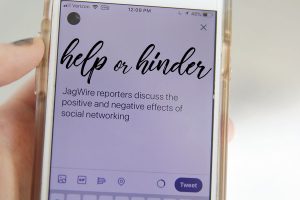Social networking isn’t as great as it seems
From fake news to exclusion, social media can have toxic effects
November 10, 2017
To preface, I use social media as much as the next person. I use everything from Twitter to Tumblr to Pinterest to Snapchat to Reddit to Instagram. Houseparty and Oovoo are on my phone, too. I even joined in on the Sarahah madness (but didn’t like promoting it via Snapchat). Social networking consumes a big part of my life — bigger than I’d like to admit. In fact, in the past week, according to my phone, 44 percent of my battery was dedicated to social networking platforms. That’s higher than I anticipated.
There’s no denying there are benefits to social networking: it’s a platform for change and (mostly) great for communication. I met my Internet friend through Instagram and I’ve learned about her life across the Atlantic in the Bristol, U.K., so I can’t say that nothing good has come from social media. However, social networking’s rose-colored filter doesn’t mask everything.
I can’t approach this opinion without touching on fake news — it’s everywhere. One share on Facebook of an article with incorrect facts can start a wildfire. We saw counselor to President Donald Trump Kellyanne Conway’s Bowling Green Massacre explode, crushing the credibility of Conway and associated parts of the government. The JagWire newspaper even covered the rise of fake news and the lack of national trust that stemmed from it. It’s no secret that, for a lack of better phrasing, people make stuff up. Sites like PolitiFact and FactCheck are outlets that prove social media needs to be taken with a grain of salt, which is what most people don’t do. If you ever get the chance, scroll through those websites and see just how much false information you can round up.
While this seems like old news, social networking has been proven to be detrimental to mental health. According to Cyberpsychology, Behavior and Social Networking, there is “a statistically significant positive correlation between depressive symptoms and time spent on [social networking sites].” This starts the vicious cycle of using social media as a cure, and when you don’t get the boost you had hoped for, you end up back where you started. In addition, self-esteem is also affected by the overexposure of social networking. I’ve experienced these effects firsthand. In ways, says Cyberpsychology, social networking promotes narcissistic behavior, which has dangerous outcomes. While my social media overexposure hasn’t turned me into a narcissist, my self-esteem has definitely suffered because I have the tendency to compare myself to other people.
As a side note, it’s worth noting that Cyberpsychology referenced a separate article about how social networking can have a positive influence on self-esteem.
To switch gears, a couple years ago, I wrote an opinion about jealousy and how it can be used to help us grow as people. However true that may be, my time on social media has made one thing increasingly clear: social networking is one of the biggest roots of jealousy. Admit it — you’ve seen pictures of your friends burying their toes in the golden sand, surrounded by the seemingly endless stretch of crystal ocean waters. Your stomach probably knotted and you probably thought, “I wish I was there.” That’s jealousy at work. A more notable example of social media jealousy is seen within relationships. Psychology professor Ira E. Hyman, Jr., Ph.D., of Western Washington University thoroughly evaluates jealousy of a relationship through Facebook and how “the ability to access a partner’s social network may not improve the quality of one’s relationship.”
A big thing I’ve had a problem with on social media is misconceptions in messages. If you know me, I can be incredibly sarcastic; I try to make it clear with my tone and over-exaggeration. On social media, sarcasm is much more difficult to detect because, obviously, you can’t hear their voice. It’s easier to understand when people type “!!11!1!!!!1!” or are being ironic with their emoji usage. A girl on Snapchat, whom I’m associated with, posted a video of some Bonner Springs kids throwing baby powder at a football game with (something to the effect of) the caption “Come on, Mill Valley.” Because I legitimately thought she didn’t understand why we had baby powder banned from football games, I told her the reason why we couldn’t use it. Some boy grabbed her phone and responded for her, essentially telling me, in the rudest way possible, she was being sarcastic. Because I couldn’t wrap my head around how that could be sarcasm, I went back and watched the video again. This time, I turned the volume up and heard my friend say something obviously sarcastic in the background. I apologized to the girl for the misunderstanding and went on with my night. I sort of hated myself for a while after that, and I’m even more wary on social media because of it.
Finally, a big negative effect of social media I’ve faced is the feeling of exclusion and loneliness. For some reason, I’ve done a good job of inserting myself into groups of tight-knit friends who do everything together. I see how much fun they’re having on Snapchat and Instagram all the time. I see how they have sleepovers and go to movies and go shopping and all those girly things. A thought crosses my mind: why wasn’t I invited? Throughout middle school and high school, I’ve talked to my mom about my exclusion and she has insisted they just don’t think of me and that I need to put myself out there more. This isn’t a rare occurrence for me, which is why whenever I notice myself feeling a little out of place in the friend group, I simply avoid those Snapchats or Instagram pictures. The exclusion hurts, and the feeling almost triggers unprecedented resentment.
As many negative effects of social networking there are, it’s important to realize the other side of the spectrum. Social media does connect people and build relationships, but there are so many things that can go wrong on social media. People and their feelings are crushed, and so many people enjoy hiding behind a username. As a result, cyberbullying is a massive effect of the social media culture. The psychology of social media — like group polarization, groupthink, deindividuation, social traps, aggression and such — comes into play and hits where it hurts. There is so much to lose through social networking, and it’s impossible to overcome or stop it.











